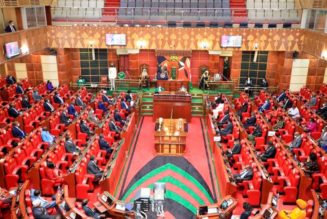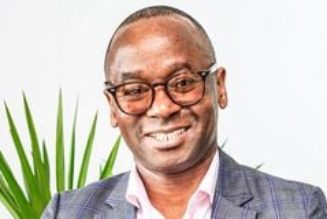Weekend with the CEO
Diana Orry Seem jams to reggae in the ‘lighthouse of West Africa’
Saturday February 17 2024

Diana Orry Seem, Ecobank Group Head of Cards. PHOTO | POOL
Maybe in another world, Diana Orry Seem would have been an airbrushed air hostess, flying from country to country and looking down upon those stuck in the unforgiving overlapped Nairobi traffic jams, the kind of traffic that competes with every conceivable noise and every imaginable variation on the theme of human rage and impatience. It’s not why she wanted to be an air hostess, but it’s why she left for Togo. “There is no such thing as a traffic jam here,” she beams.
If Nigeria is the self-assured firstborn and Ghana the self-composed lastborn, Togo is the oft-forgotten middle child, full of contradictions. Like housing Ecobank, one of the largest banks in Africa, where Diana works, managing 33 markets as the Group Head of Cards.
That is, of course, when she is not in the other market looking for mrenda, her go-to delicacy. Food is an important aspect of her life, a reference point, an article of faith, her Rosetta stone. She talks fondly of her Western Kenya Maragoli roots: going to mtoni to fetch water, singing at Friends’ Church Quakers, being called a mzungu.
She’s made a home in Togo, and Togo has made her feel at home. She has slowly learned their official language, French; and Togo too has respected her love language: no traffic jams.
How was the shift from Kenya to Togo?
It was one of the most conflicting moments in my life. This opportunity came up during the Covid-19 pandemic period. I was doing my former boss’s job (who had just left) but was based in Kenya. It took a Kenyan colleague, already in Togo, to ease me in.
One of the things that won me over was the fact that there was no traffic congestion. It takes me at most 30 minutes to get to any destination in Lome. In Kenya, I live in Kitengela so you can imagine the traffic I encounter. Plus, now I live right next to the ocean [chuckles].
What was your biggest culture shock?
First was the language. This country is primarily French-speaking. I am English—Swahili oriented. I told myself I’d take classes, but Covid-19 happened. I mainly depend on Duolingo, but now I can confidently follow a French conversation and, when necessary, actually speak it.
Secondly, the food. Togolese people put a bit of pepper—not as much as the Nigerians and Ghanaians — but my stomach still can’t handle it. I am one of those Kenyans who carry suitcases of flour, maziwa mala, vegetables, sausages and other foodstuff when returning to foreign countries. [chuckles] But as a Maragoli, I eventually figured out how to get mrenda and ugali. In Togo, they do fermented ugali and eat it cold. But they have good tilapia.
What’s the first thing you did when you arrived there?
So, I first moved with my mom while my husband and children remained in Kenya. We arrived on a Sunday and first wanted to cook something as we had brought our food from Kenya. But we didn’t have salt. The Kenyan colleague who gave me the pep talk lived directly behind my house. I did not have a local SIM sim card to call her, so I took one of my stools, set it next to the fence, stepped on it and shouted her name until her husband came out and asked for some salt and matches.

Diana Orry Seem, Ecobank Group Head of Cards. PHOTO | POOL
Did your husband and children eventually follow you to Togo?
Initially, we didn’t plan to move the whole family, but Covid happened. I had asked the airline to let me know if anything ever happened so I could get out. A day before the Kenyan borders were closed, I had travelled to Ghana. I told my family to book the tickets, we would pay at the airport. I was among the last passengers to arrive that midnight borders were closed.
After Covid-19, I left with the children because they were doing online studies. They’ve never returned. Togo has grown on them. I think they have been praying for me to stay here longer.
Do you want to?
It has grown on me, too. My last born, who is nine years old, refers to Togo as home now, haha!
What was your nickname growing up?
Mzungu. I am a half-caste. I grew up at Majengo in Vihiga County. I was raised by my mom and grandmother. I never saw my dad, but I got different versions of why he was never around whenever I inquired. He is deceased now. I remember going to mtoni (river) to fetch water and to Friends’ Church to sing Christmas carols…it was a good childhood.
How did growing up without your dad change how you raise your children?
Hmm! Twelve years later, when my mom remarried, I had a stepdad. He was good to me as a child. I had my first child during my third year of university studies and have been married to the same guy for almost 20 years. He is very supportive and has never tried to put me down. When I was moving here, it was a conflicting time because I didn’t want to raise the children alone. But he decided to upend his life and move us all here even though he didn’t need to. He has stood by me. Our firstborn is now 18 and out of the house.
What do you miss about your childhood?
The simplicity of life. I recently turned 40. I usually write down some things about my childhood I missed on my Instagram page. My grandmother was very entrepreneurial, and my mother was very hardworking. She put me through Aga Khan High School in Kisumu to expose me to different cultures. I miss that simplicity of life: playing around, going into anyone’s house without the fear that harm would come to you. I see such simplicity today in Lomé when neighbourhood children come directly to my house from school. We have that kind of warmth.
What remains unchanged about you since childhood?
The Maragoli in me. I have a strong clique of childhood friends that I still keep. We often reminisce about our childhood as we converse in Kimaragoli. My boys [sons] say that’s a woman’s language because they have only heard me, my mom, sister, and friends speak Kimaragoli. When I am sad or excited, we will talk in the same sentence in English, Kimaragoli and Swahili. For emphasis, haha!
Have you passed the Maragoli gene to the boys?
No. They didn’t pick it, but they understand one or two words when I talk about food or when I am angry.
Speaking of, what’s your go-to meal to cook?
Chapati. When I have impromptu guests, pilau. It is ugali, chicken, and vegetables when I am just at home. Maziwa Mala and avocado have to be somewhere there. I like matoke and matumbo too. When they [sons] want to bribe me at home, that’s what they cook.
What’s a special ritual you do as a family?
Pray every evening. We are Catholics now, but every one of my children is allowed to select a specific prayer. We also like random gifts. They don’t associate gifts with birthdays or Christmas. Randomly, we gift one another throughout the year.
What are you asking God for now?
I am praying for good health. I have seen people suffer from cancer. It’s okay when it’s a statistic until it hits close to home. I am also asking that God give my children an opening out there. I struggled when my son said he wanted to study in Canada. We had a whole path cleared for him in Kenya; finish studies in Nairobi School, get admitted to the University of Nairobi, graduate, do his masters, and then go elsewhere. But when we got here, his mindset changed. I know I should not limit them to my capacity; I just pray that God will open doors for them.
What will the girl you once were tell the woman you now are?
Hmm. What I wanted as a girl is nowhere close to what I have as a woman. I didn’t envision a husband who is present for his family, but I love that that’s who I have. I always wanted to be an air hostess and tried so hard, haha! My grandmother would take me to every uncle and aunty who used to travel by plane because we thought they knew the planes’ owners and could get us those jobs, haha!
I and a close friend, who also got pregnant around the same time as me, got into sales after campus. We were living in Githurai, where I was doing my teaching practice. We wrote letters applying for jobs in all banks because someone had said banks were hiring.
My son was staying with my mom back home then, and she got me a BOG [Board of Governors] teaching job. But before I could travel to Western Kenya, one of the cleaners at Barclays’ Head Office called me and said I should go to a building called Bank House, where they were employing salespeople. After an interview, I started work the following Monday. Now I am here.
What’s your guilty pleasure?
I have a sweet tooth. Cakes, pastries, the works. But I can’t stand sugar in my tea, haha! I have also, through my friends, acquired a new taste for travelling. If I can, I will work harder to get a bonus and get a chance to do a trip. Bliss.
What’s one place you’ve gone that has stuck with you?
Ghana. The Volta River. It is huge and just chilled out.
How do you spend your weekends now?
One of my other guilty pleasures is sleeping. If I am not at the church or hosting, I am sleeping. From time to time, I love beats, not necessarily the lyrics. I am a reggae girl. I am different people in reggae zones, the church, and at work.
What reggae song are you bopping to now?
Ethiopian rock attack [by Aba Kush].
Who do you know that I should know?
My childhood friend Jackline Kibisu. She worked at Safaricom and now is at Citibank. She has an inspiring story; any time I feel life has reached its limit, I know I can pull through because of her. She is Citibank’s sub-Saharan Africa Receivables Product Head in charge of 11 countries. Can I add something?
Sure…
I don’t want to identify with titles. I want to identify with who I am, rather than what I am. I take joy in seeing young girls who have dropped out of school get back to school, sometimes by paying their school fees. I am a Mukumu Girls’ alumnus, and they have given me strength, whether to mentor or coach; these are the things I look forward to.









